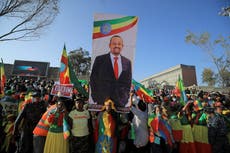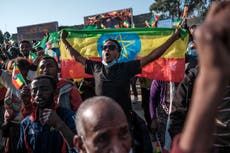Waiting for war: Vigilantes patrol Ethiopia’s capital as conflict intensifies
Thousands of volunteers in Addis Ababa have heeded a call to arms, but Tigrayans say they are being unfairly targeted and detained, reports Fred Harter

Shortly after nightfall, a group of eight men gather on a street in Addis Ababa, Ethiopia’s capital. All are wearing hi-vis orange vests, some are carrying long sticks. Leading them is Habtamu Reta, a taxi driver who currently spends most nights patrolling his neighbourhood.
“We are here to avert attacks and the disruption of our community by covert agents,” he explains as he and his fellow volunteers prepare to set out for the night.
“This is not a normal time.”
With rebels from the Tigray People’s Liberation Front (TPLF) inching closer and threatening to topple the government in a worsening civil war, a sense of siege has descended on Addis Ababa, a once-vibrant regional hub and the seat of the African Union.
Tens of thousands of people have been killed and millions displaced in the year-long conflict between Ethiopian and allied forces and fighters from the country’s northern Tigray region.
Ethiopia imposed a nationwide state of emergency this month, suspending civil liberties and giving the police powers to detain anyone accused of supporting "terrorist" activities.
Officials and even prime minister Abiy Ahmed himself have urged citizens to take up arms and defend their neighbourhoods as rumours swirl of Tigrayan spies and saboteurs operating in Addis Ababa.
Abiy – who has travelled to the northeastern Afar region to personally direct troops on the frontlines – said in a Facebook post that people should “organise and march through [any] legal manner with every weapon and power ... to prevent, reverse and bury the terrorist TPLF.”
In the capital, tens of thousands of people have heeded the call.
Patrols of vigilantes wielding sticks and sometimes hollow metal bars are now a common sight on the streets after dark, stopping people and demanding to see their ID cards.
We are protecting the people from strange times
The police said that about 150,000 male and female volunteers had been trained in combating crimes, community policing, discipline, and physical fitness.
Habatmu and other members of his patrol group said they had received physical “military” training from the local council, as well as instruction on how to identify and question suspects.
Anyone deemed a threat is handed over to the police for arrest.
One evening last week they were questioning a homeless man who had been sleeping in the street. The group said they had also recently caught someone trying to cut telecom wires with a pair of pliers, and apprehended a person found with drugs in his car.
“We get a lot of people with suspicious ID cards who look like spies,” said Sami Haile, a member of the patrol who makes his living from tips earned as a parking attendant.

Yet Tigrayan residents of Addis Ababa say they are living in fear of these vigilantes, who they accuse of targeting them for their identity.
The state-appointed Ethiopian Human Rights Commission (EHRC) said thousands of people, mostly Tigrayans, have been detained in recent weeks. It added that the detentions appear to be “based on ethnicity” and it has raised concerns over the treatment of the suspects.
“Sufficient efforts are not being exerted to investigate whether informant tips are not themselves ethnic-based, and to investigate and verify that there are indeed reasonable grounds to continue to detain persons arrested based on such tips,” the EHRC said recently.
Several Tigrayans told The Independent that their friends and family members have been seized in police raids on offices, homes and bars. Some of them have been released but most are still being held without charge at police stations or other unknown locations, they said.
“They are searching every home and arresting people,” said one Tigrayan resident of Addis Ababa, who asked to remain anonymous.
He said his cousin was arrested after he was overheard speaking Tigrinya, the language of Tigray, and held in a block that housed dozens of others. When a friend tried to visit, he was arrested as well, the man said.

Tigrayans make up around six per cent of Ethiopia’s population of 110 million and occupied key positions under the former TPLF-led regime, which dominated politics for 27 years until it was forced out by protests and replaced by the current government under Abiy in 2018.
The TPLF is deeply unpopular with many Ethiopians, who resented its repressive rule.
A second Tigrayan said his niece, a journalist, had been arrested after the state of emergency was declared on 2 November. Her family do not know where she is and have not been able to contact her.
“Everyone is in absolute darkness as to where she has been taken and what might have happened to her,” he said on condition of anonymity.
TPLF spokesperson Getachew Reda said earlier this month that the state of emergency was being used as cover to target and detain Tigrayans.
The police insists it is only detaining people aiding the TPLF and its ally, the Oromo Liberation Front, an insurgent group from the Oromia region surrounding Addis Ababa. Both are proscribed terrorist groups.

The foreign ministry has described reports of ethnic-based arrests as “disinformation”.
Approximately 70 aid truck drivers and at least 16 other local staff working for the United Nations were also detained this month, although most have since been released.
The drivers were arrested in Semera, the launching point for aid convoys to Tigray, where the UN estimates that 400,000 people are in the grip of famine.
As the fighting draws closer, several Western embassies have wound down their presence in Addis Ababa, withdrawing non-essential staff and urging residents to leave while they still can. Relatives of international UN staff joined the exodus last week after they were ordered home.
Despite the diplomatic alarm and encroaching conflict, daily life continues as normal in the capital. Bars and shops remain open, and rush hour traffic still clogs the main routes.
Only at night does the mood change, as the streets empty and vigilantes start their patrols.
On one such recent watch, Habtamu insisted that all Ethiopians should rally behind the government and stay vigilant in the face of internal enemies.
The message was met with murmurs of approval by the rest of his group, among them Haile.
“We are protecting the people from strange times,” Haile said.
Join our commenting forum
Join thought-provoking conversations, follow other Independent readers and see their replies
Comments


Bookmark popover
Removed from bookmarks